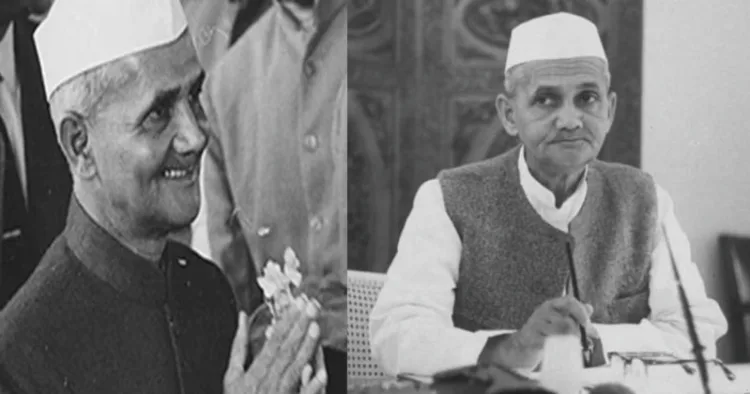On January 11, 2025, the nation observes the 59th death anniversary of Lal Bahadur Shastri, Bharat’s second Prime Minister. A leader who embodied humility, integrity, and selfless service, Shastri’s contributions to Bharat’s progress and his visionary leadership during critical moments continue to resonate with generations.
Born on October 2, 1904, in Mughalsarai (now Deen Dayal Upadhyaya Nagar) in Uttar Pradesh, Lal Bahadur Shastri’s early life was marked by hardship. His father, a schoolteacher, passed away when Shastri was just 18 months old, leaving his family in dire straits. Raised by his mother and extended family, Shastri’s formative years were spent overcoming poverty.
Nicknamed “Nanhe” (little one), he often walked miles barefoot to attend school, even in the scorching heat of the Bharat’s summer. This resilience and simplicity shaped his character, preparing him for the challenges that lay ahead.
Shastri’s political journey began at the age of 16 when he joined Mahatma Gandhi’s Non-Cooperation Movement against British colonial rule. Inspired by Gandhi’s principles of non-violence and self-reliance, Shastri fully dedicated himself to Bharat’s independence struggle.
His participation in movements like the Salt Satyagraha and the Quit India Movement led to multiple imprisonments, yet each term in jail strengthened his resolve. Shastri’s calm demeanor, coupled with an unwavering commitment to justice, earned him respect among his peers and the masses.
After independence in 1947, Shastri played key roles in shaping Bharat’s governance. As the Union Railway Minister, he displayed rare moral accountability by resigning after a major train accident, demonstrating his dedication to public service and responsibility.
Later, as Home Minister, he reinforced Bharat’s internal security and emphasised communal harmony during turbulent times. His administrative acumen and dedication earned him the trust of Jawaharlal Nehru, Bharat’s first Prime Minister, and the Indian National Congress.
Following Nehru’s death in May 1964, Shastri was chosen as his successor. Despite being seen as a leader of quiet demeanor, Shastri’s tenure as Prime Minister was marked by decisive leadership and transformative policies.
One of the most challenging periods of his premiership came during the Indo-Pak war of 1965. Under his leadership, Bharat stood united against external aggression. His slogan “Jai Jawan, Jai Kisan” (Hail the Soldier, Hail the Farmer) boosted the morale of soldiers defending the nation and farmers ensuring food security amid shortages.
Recognising the need for self-sufficiency, Shastri promoted the Green Revolution, paving the way for agricultural innovation and food production growth in Bharat.
Shastri’s life and leadership were cut short on January 11, 1966, in Tashkent, Uzbekistan (then part of the Soviet Union). He was in Tashkent to negotiate peace with Pakistan after the 1965 war and had just signed the Tashkent Agreement with Pakistani President Ayub Khan. Tragically, Shastri passed away hours after the agreement’s signing, reportedly due to a heart attack.
However, his sudden demise has remained a topic of speculation and controversy, with many calling for further investigation into the circumstances surrounding his death. Despite these uncertainties, Shastri’s legacy as a statesman who served his country with humility and dedication remains untarnished.
Lal Bahadur Shastri’s life is a testament to the power of simplicity and resilience. His iconic slogans, visionary policies, and moral integrity continue to inspire Bharat’s leaders and citizens.
Some of his most memorable words include:
“Jai Jawan, Jai Kisan.”
“We believe in peace and peaceful development, not only for ourselves but for people all over the world.”
“Discipline and united action are the real source of strength for the nation.”
“We must fight for peace bravely as we fought in war.”
His efforts to uplift the dignity of every individual, regardless of their background, and his call for unity and hard work, resonate deeply in contemporary Bharat.



















Comments